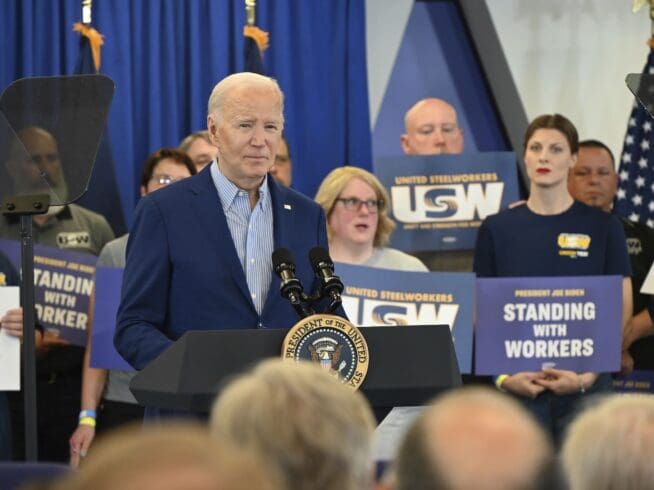Michigan Democrats look to cut prescription drug prices and expand family leave in 2024
Senate and House legislative leaders reveal the Democratic majority’s targets for the coming year in new interviews with the Michigan Independent.

The Michigan Legislature is scheduled to reconvene this week following its winter break, and the Democratic majority already has a number of issues it plans to home in on this year, such as lowering the cost of prescription drugs, paid family and medical leave, and no-fault auto insurance reform.
Michigan’s political landscape in 2024 looks a lot different from when Democrats first gained control of state government this same time last year: There are currently two fewer Democratic members in the House of Representatives, the state budget will not have a surplus in COVID dollars, and there are the added pressures of an election year.
Even in these circumstances, Senate Majority Leader Winnie Brinks, a Democrat from Grand Rapids, said her caucus is ready to face whatever challenges may present themselves.
“We fully intend to be as productive as possible,” Brinks said. “We will keep up a solid pace; we will be dealing with important issues and as many of them as we can this year.”
Policies that would lower the cost of living for families are high on the agenda for Brinks and House Majority Floor Leader Abraham Aiyash, a Democrat from Hamtramck.
In interviews with the Michigan Independent, they both pointed to legislation introduced last fall aimed at making prescription drugs more affordable. If its creation is passed into law, a prescription drug affordability board would be charged with conducting cost analyses for certain prescription drugs and determining whether to place a cap on the amount a patient pays for the product.
Growing the state’s economy and population has also been a major focus for lawmakers in recent years. Brinks said such expansion can be approached by building on some of the policies that were signed into law last year. Those new laws prevent discrimination against LGBTQ individuals, removed the state’s abortion ban from the books, expanded the earned income tax for working families, and repealed the pension tax.
“You’ll see us addressing economic development with a community development lens as well so that we’re creating those kinds of communities where people don’t just come here because there’s a good job,” Brinks said. “They come here, they fall in love with being here in Michigan and they stay here. … And part of doing that is just increasing quality of life in the communities where we are attracting these new jobs.”
Aiyash mentioned paid family and medical leave for parents who give birth or adopt children as another significant issue on the table.
Currently, state law only requires large businesses with 50 or more employees to offer short-term medical leave. In 2020, Gov. Gretchen Whitmer created a 12-week paid family leave program for all state employees. A Democratic proposal still in House committee would expand the program to cover all Michigan residents and extend the leave to 15 weeks. Republicans have criticized the plan as adding stress for taxpayers, but supporters of the legislation said the extra time would benefit the state’s workforce by prioritizing the health of parents and their children.
Aiyaish discussed tackling no-fault automobile insurance reform, which he characterized as “fixing the fix.” In the event of a car accident, no-fault auto insurance covers the insured motorist’s medical expenses, lost wages and damages to other’s property, no matter who caused the accident.
A bill package that passed out of the Senate with bipartisan support in October would increase reimbursement rates from insurance companies to medical facilities that care for injured motorists. Bill sponsors put forward the plan as a solution to a 2019 law that largely upended Michigan’s no-fault insurance system. The law was meant to address auto insurance costs in the state, which ranked among the highest in the nation, by allowing driver’s to choose their level of personal injury protection (PIP) and setting up a fee schedule for how much health care providers could bill insurance companies for auto-related injuries; however, this had an unintended effect of limiting the care provided to people who have been severely injured in car accidents.
Democrats see the election year as a time to move on bills dealing with election protections and government transparency. According to Brinks, they plan on expanding a newly passed law requiring lawmakers to disclose their personal finances to include political fundraising accounts in an attempt to identify conflicts of interest. She said legislation that would subject the Legislature and the governor’s office to the Freedom of Information Act will be heard in committee early this year.
Elections will affect the Democratic majority’s agenda this year in more ways than one. Two Democratic House members resigned after winning local mayoral races last November, and the chamber is now evenly split between Democrats and Republicans. Whitmer has called a special primary election on Jan. 30 and a special general election on April 16 to fill the vacant seats.
Aiyash believes Democrats will retain the seats.
“The goal is to keep and expand the majority, but we have a responsibility to govern, to make sure that we’re uplifting the priorities of working families across our state. And we’re going to keep doing that, just like the people saw in 2023,” Aiyash said.
Brinks said they will continue to move things in the Senate in the meantime, but they want to be wise about choosing bills to take up to accomplish their most important priorities.
Whitmer’s State of the State address, in which she will outline her own policy priorities, and the Consensus Revenue Estimating Conference held by the Senate and House fiscal agencies and the Department of Treasury, which begins state budget discussions for the upcoming fiscal year, will further guide Democratic legislators’ actions throughout the year.
The state budget process this year specifically will be a major conversation in Lansing, because Democrats won’t have access to a one-time surplus of COVID relief dollars as they did the year prior. Brinks said Democrats intentionally used much of the $9 billion surplus on one-time projects to reinvest in budget areas that had been neglected in previous terms. As the House and Senate begin conversations about this year’s budget, Brinks and Aiyash both said it will focus heavily on investments in infrastructure, local communities and education.
“We’re doing the groundwork, but we’ll certainly be adaptable to whatever the new realities are of this coming budget,” Brinks said. “I’m confident that we’ll be able to put together a responsible budget and live within our means.”




